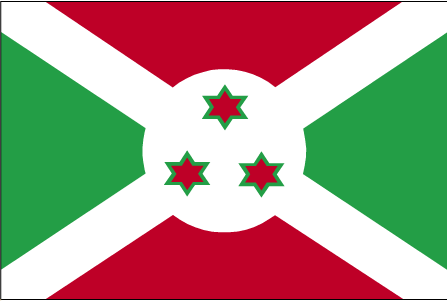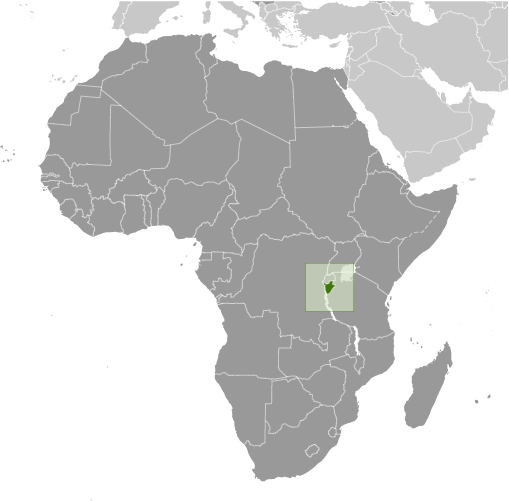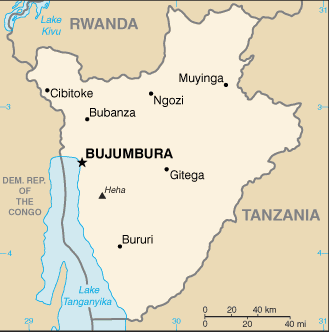Burundi's first democratically elected president was assassinated in October 1993 after only 100 days in office, triggering widespread ethnic violence between Hutu and Tutsi factions. More than 200,000 Burundians perished during the conflict that spanned almost a dozen years. Hundreds of thousands of Burundians were internally displaced or became refugees in neighboring countries. An internationally brokered power-sharing agreement between the Tutsi-dominated government and the Hutu rebels in 2003 paved the way for a transition process that led to an integrated defense force, established a new constitution in 2005, and elected a majority Hutu government in 2005. The new government, led by President Pierre NKURUNZIZA, signed a South African brokered ceasefire with the country's last rebel group in September of 2006 but still faces many challenges.
Population
9,863,117
Country comparison to the world:85
note:estimates for this country explicitly take into account the effects of excess mortality due to AIDS; this can result in lower life expectancy, higher infant mortality, higher death rates, lower population growth rates, and changes in the distribution of population by age and sex than would otherwise be expected (July 2010 est.)
Nationality
Noun:Burundian(s)
Adjective:Burundian
Ethnic groups
Hutu (Bantu) 85%, Tutsi (Hamitic) 14%, Twa (Pygmy) 1%, Europeans 3,000, South Asians 2,000
Religions
Christian 67% (Roman Catholic 62%, Protestant 5%), indigenous beliefs 23%, Muslim 10%
Languages
Kirundi (official), French (official), Swahili (along Lake Tanganyika and in the Bujumbura area)
Country Name
Conventional long form:Republic of Burundi
Conventional short form: Burundi
Local long form:Republique du Burundi/Republika y'u Burundi
Local short form:Burundi
Former:Urundi
Government Type
republic
Capital
Name:Bujumbura
Geographic coordinates:3 22 S, 29 21 E
Time difference: UTC+2 (7 hours ahead of Washington, DC during Standard Time)
Administrative divisions
17 provinces; Bubanza, Bujumbura Mairie, Bujumbura Rural, Bururi, Cankuzo, Cibitoke, Gitega, Karuzi, Kayanza, Kirundo, Makamba, Muramvya, Muyinga, Mwaro, Ngozi, Rutana, Ruyigi
Independence
1 July 1962 (from UN trusteeship under Belgian administration)
National Holiday
Independence Day, 1 July (1962)
Constitution
ratified by popular referendum 28 February 2005
Legal system
based on German and Belgian civil codes and customary law; has not accepted compulsory ICJ jurisdiction
Suffrage
18 years of age; universal (adult)
Executive branch
Chief of state: President Pierre NKURUNZIZA - Hutu (since 26 August 2005); First Vice President Yves SAVINGUVU - Tutsi (since 9 November 2007); Second Vice President Gabriel NTISEZERANA - Hutu (since 9 February 2007); note - the president is both the chief of state and head of government
Head of government:President Pierre NKURUNZIZA - Hutu (since 26 August 2005); First Vice President Yves SAVINGUVU - Tutsi (since 9 November 2007); Second Vice President Gabriel NTISEZERANA - Hutu (since 9 February 2007)
Cabinet:Council of Ministers appointed by president
(For more information visit the World Leaders website)
Elections:the president elected by popular vote for a five-year term (eligible for a second term); note - the constitution adopted in February 2005 permits the post-transition president to be elected by a two-thirds majority of the parliament; next elections to be held on 28 June 2010; vice presidents nominated by the president, endorsed by parliament
Election results: Pierre NKURUNZIZA was elected president by the parliament by a vote of 151 to 9
Legislative branch
bicameral Parliament or Parlement, consists of a Senate (54 seats; 34 members elected by indirect vote to serve five-year terms, with remaining seats assigned to ethnic groups and former chiefs of state) and a National Assembly or Assemblee Nationale (minimum 100 seats, 60% Hutu and 40% Tutsi with at least 30% being women; additional seats appointed by a National Independent Electoral Commission to ensure ethnic representation; members are elected by popular vote to serve five-year terms)
Elections:Senate - last held on 29 July 2005 (next to be held on 23 July 2010); National Assembly - last held on 4 July 2005 (next to be held on 23 July 2010)
Election results:Senate - percent of vote by party - NA%; seats by party - CNDD-FDD 30, FRODEBU 3, CNDD 1; National Assembly - percent of vote by party - CNDD-FDD 58.6%, FRODEBU 21.7%, UPRONA 7.2%, CNDD 4.1%, MRC-Rurenzangemero 2.1%, others 6.2%; seats by party - CNDD-FDD 59, FRODEBU 25, UPRONA 10, CNDD 4, MRC-Rurenzangemero 2
Judicial branch
Supreme Court or Cour Supreme; Constitutional Court; High Court of Justice (composed of the Supreme Court and the Constitutional Court)
Political Parties and Leaders
governing parties: Burundi Democratic Front or FRODEBU [Leonce NGENDAKUMANA]; National Council for the Defense of Democracy - Front for the Defense of Democracy or CNDD-FDD [Jeremie NGENDAKUMANA]; Unity for National Progress or UPRONA [Bonaventure NIYOYANKANA]
note: a multiparty system was introduced after 1998, included are: National Council for the Defense of Democracy or CNDD [Leonard NYANGOMA]; National Resistance Movement for the Rehabilitation of the Citizen or MRC-Rurenzangemero [Epitace BANYAGANAKANDI]; Party for National Redress or PARENA [Jean-Baptiste BAGAZA]
Political pressure groups and leaders
Forum for the Strengthening of Civil Society or FORSC [Pacifique NININAHAZWE] (civil society umbrella organization); Observatoire de lutte contre la corruption et les malversations economiques or OLUCOME [Gabriel RUFYIRI] (anti-corruption pressure group)
Other:Hutu and Tutsi militias (loosely organized)
International organization participation
ACCT, ACP, AfDB, AU, CEPGL, COMESA, EAC, FAO, G-77, IAEA, IBRD, ICAO, ICCt, ICRM, IDA, IFAD, IFC, IFRCS, ILO, IMF, Interpol, IOC, IOM, IPU, ISO (subscriber), ITU, ITUC, MIGA, NAM, OIF, OPCW, UN, UNAMID, UNCTAD, UNESCO, UNIDO, UNWTO, UPU, WCO, WFTU, WHO, WIPO, WMO, WTO
Diplomatic representation in the US
Chief of mission: Ambassador Angele NIYUHIRE
Chancery: Suite 212, 2233 Wisconsin Avenue NW, Washington, DC 20007
Telephone:[1] (202) 342-2574
FAX:[1] (202) 342-2578
Diplomatic representation from the US
Chief of mission:Ambassador Pamela J. H. SLUTZ
Embassy: Avenue des Etats-Unis, Bujumbura
Mailing address:B. P. 1720, Bujumbura
Telephone:[257] 223454
FAX:[257] 222926
Flag description
divided by a white diagonal cross into red panels (top and bottom) and green panels (hoist side and fly side) with a white disk superimposed at the center bearing three red six-pointed stars outlined in green arranged in a triangular design (one star above, two stars below); green symbolizes hope and optimism, white purity and peace, and red the blood shed in the struggle for independence; the three stars in the disk represent the three major ethnic groups: Hutu, Twa, Tutsi, as well as the three elements in the national motto: unity, work, progress










